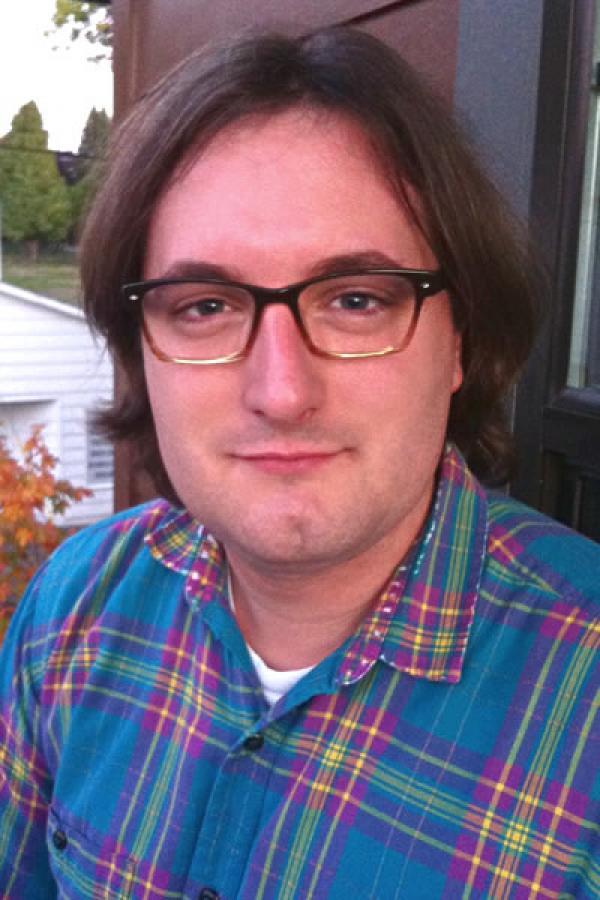Matthew Sailor

Photo by Meagan Morrow
Bio
Matt Sailor lives and writes in Portland, Oregon. For most of his life, he lived in Atlanta, where he earned his MFA in fiction writing from Georgia State University. While studying at GSU, he received a Paul Bowles Fellowship and served as editor-in-chief of New South for two years. Currently, he serves as an associate editor for NANO Fiction. His fiction and essays have appeared in such publications as AGNI, PANK, Barrelhouse, and Paper Darts. His ongoing essay series, “Great Moments in Cinematic Drinking,” is featured online through Hobart. He is at work on his first novel, 1985.
Author's Statement
Much has been written about the inherent desperation of the creative act. As a writer, you take a dive into murky depths, with little assurance that you will find your way back to the light. Depending on how you’re feeling on a given day—how the writing’s going, how many cups of coffee you’ve had—it can seem like an exercise in blind faith, or in utter stupidity.
I couldn’t have received this NEA fellowship at a more fortuitous time in my career as a writer. Fresh out of a graduate program in creative writing, living in a new city where I had few friends and fewer ties to the literary community, I saw my future as blank, inscrutable. The fellowship offered me security. Financial, yes, and I will never sell short the world-changing impact of the grant, for which I am incredibly grateful. But more than that, it found me at the edge of the water and gave me a push, the assurance that I’m not crazy, not stupid to be making that deep dive into the depths.
Since receiving the honor, I have continued work on my first novel, 1985, a semi-autobiographical story of mid-Michigan in the mid-'80s. With the help of the NEA, I hope to finish it this year, after over three years of work. In addition to allowing me the opportunity to travel to my birthplace for research, the grant has given me the vital flexibility to dive into the work of writing without reservation, without worrying if what I’m doing is stupid or futile or fruitless. Most days, at least. As long as I’ve had enough cups of coffee.
Excerpt from "Vinni Pukh"
I’d been assigned Ivan by the Cultural Ministry; to my frame of reference, he seemed like nothing so much as a mobster, a henchman, but his official title was “Cultural Attaché.” This was a period when Communism was in its death throws, not exactly the sleeping giant Reagan would have had you believe in. Gorbachev had introduced his perestroika initiative earlier that year, and in Czechoslovakia, while outright criticism of the Central Committee was still rare, there was a growing acceptance that the end was, more or less, nigh. It was like watching the final season of Three’s Company, not because you had any interest in whether or not Jack Tripper would end up with Vicky Bradford (in fact, ever since Suzanne Somers left the show, you’d had no horse in that particular race), but because you might as well see it out to the end. This is how Ivan put it to me one night as he was driving me in his GAZ-12 ZIM through the frosted cobblestones of the city—I remember it very clearly, but I also happened to write it down in my notebook, in the margins beside a character analysis of the Russian Piglet (Pyatachok)—“I am waiting to see how it ends. Whichever way it happens, I know it is going to end, soon. And that is all I have to say about it.”
“Won’t your life be completely different?” I asked.
He shrugged. “I work for the government. You think there will be no government in a Democratic Republic?”
“Yes, but what if it’s violent? What if there’s war, revolution, heads on pikes, and that?”
He laughed. Ivan, thick-necked and burly as he was, had a laugh that was often indistinguishable from a cough, from the guttural noise of gathering phlegm that preceded his not infrequent spitting into the street. “At best, I am a thug. At worst, I am a bureaucrat. Do you think that the winning side should find no use for my kind?”
It was a sort of fatalism that I became well acquainted with during my time in Prague. Another time, Ivan, speaking with a man who could equally as likely have been a colleague or rival, said this: “It will be more or less the same. Perhaps they will build a McDonald’s.” Lest you should judge Ivan too harshly, lest you should return to that tired American myth of life under Communism, the lack of incentive that breeds congenital apathy, I’ll only say that during my Michigan days I’d met my share of auto workers, service station attendants, even professed radical punk rockers who exercised every bit as must concern about the future of the country, the likelihood of a soon-to-be opened McDonald’s.
("Vinni Pukh" previously appeared, in modified and expanded form, in Issue 79 of AGNI )

